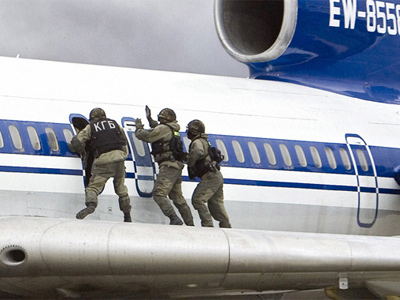Paradoxes of Counterterrorism
Fighting terrorism is fraught with contradiction, and many tactics have unintended consequences that may exact a dear price.
 RIA Novosti archive, image #341035, Ivan Rudnev.Mitt Romney hit the proverbial nail on the head when he proclaimed in a presidential debate that “we cannot kill our way out of this mess.” He was undoubtedly referring to the global war on terror that the United States has been waging for over a decade. The question remains: If not killing, then what?
RIA Novosti archive, image #341035, Ivan Rudnev.Mitt Romney hit the proverbial nail on the head when he proclaimed in a presidential debate that “we cannot kill our way out of this mess.” He was undoubtedly referring to the global war on terror that the United States has been waging for over a decade. The question remains: If not killing, then what?
After all, the U.S. struggle against terrorism boasts impressive achievements: the elimination or arrests of major Al Qaeda leaders, dismantlement of terrorists’ logistical infrastructures and severe blows to financial networks that supported terrorism. Despite these successes, experts disagree as to whether we are safer now than on the eve of 9/11, and Islamic extremism seems far from subsiding. If anything, radicalization seems to be on the rise in the Middle East, Asia and Africa. There is a growing danger that the Arab Spring is turning into a deadly winter, as the waves of democracy meet the rocks of fanaticism.
Counterterrorism, by its very nature, is fraught with paradoxes, and any of its tactics has unintended consequences that may exact a dear price. Consider the much discussed drone campaign. In some ways, it might seem like a dream solution to many of the problems besetting sustained antiterrorism efforts. Its surgical nature minimizes both the loss of innocent lives known as “collateral damage” and our own casualties. Moreover, the use of drones has yielded spectacular successes. It has afforded the elimination of major terrorist figures and disruption of radicalization and recruitment efforts.
Yet, on the other hand, the drone campaign has arguably been one of the most objectionable American military strategies of recent years. It has considerably exacerbated tensions between the United States and both the people and governments of Afghanistan and Pakistan. Moreover, the concept of sudden death by a remotely controlled device inspires a portrayal of the United States as a heartless technological empire bent on killing and destruction. This in turn fuels powerful anti-American sentiments and augments the resolve to fight. Thus, the most effective tactical tool in the fight against terrorism turns out to be a major hindrance to U.S. strategic objectives, causing Washington to be hoisted by our own petard.
Consider also the vow to never to negotiate with terrorists. First, a refusal to deal with terrorist demands may mean sacrificing the lives of one’s own countrymen, contrary to most governments’ sacred obligation to protect their citizens. Secondly, negotiations are the only logical alternative to fighting. A refusal to negotiate with terrorists paradoxically impels them to carry on their combat to the death.
Finally, governments rarely adhere to their tough-minded declarations. Whether directly or through mediators, talks typically form part and parcel of behind-the-scenes dealings in which governments engage with terrorist organizations. Even Israel, the toughest of the tough, has engaged in extensive contact with the Fatah and Hamas factions in reference to prisoner swaps, for example. Similar cases abound, including the U.S. negotiations with the Taliban. Paradoxically, to boast toughness and then to fold would only betray weakness and indecision—the opposite of what was intended.
A further paradox is that a global war against terrorism arguably contributes to its spread. An indiscriminate policy of combating terrorism, wherever it exists and irrespective of its ends, unites networks and forges marriages among unlikely bedfellows united against a common foe. For example, right-wing militias in the United States have been in contact with jihadist organizations and the German Baader-Meinhof terrorists trained with the PLO.
The dictum that “the ends do not justify the means,” which justifies the global war on terrorism, does not hold up on a closer analysis. The real justification of terrorism prevention is more complicated: a means that vitiates another moral end, like the preservation of innocent lives, is therefore inadmissible.
Yet Washington’s manifest willingness to tolerate “collateral damage” in pursuit of victory belies that presumption and betrays a willingness to sacrifice others for ends it deems of supreme importance. So in practice, ends do justify their means—both for terrorists and for ourselves. And a global war against all those who use terror inadvertently unites them against us and augments their strength.
Finally, the paradox of paradoxes is our psychological response to terrorism. The shock, fear and dismay caused by a major terrorist attack induces an existential angst, inviting both a desire to remove the uncertainty and a quest for quick closure.
This encourages simplistic black and white, “with us or against us” thinking—admitting no nuances, no shades of gray. But such thinking is naïve and unrealistic. It’s the very opposite of what is needed, as the complexities of counterterrorism defy ready categorization. An effective policy of combating terrorism requires a fine balancing act. It must reconcile tactical means with strategic ends, and forge a comprehensive battle plan aimed at reversing the tide of radicalization that threatens to erupt into violence.
Arie W. Kruglanski is Distinguished University Professor in Psychology at the University of Maryland, and Senior Investigator at START, The Center for the Study of Terrorism and the Response to Terrorism. Anna C. Sheveland is a Research Associate at the Department of Psychology at the University of Maryland.
